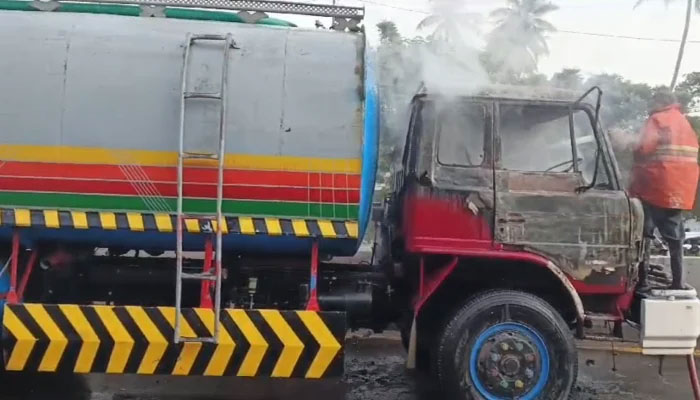Death at every turn
This accident proves what was already evident: laws mean nothing if not enforced
A routine medical check-up turned into an unspeakable tragedy for a young couple in Karachi when their motorcycle was crushed by a water tanker on March 24. The most harrowing detail of the accident -- so severe that the pregnant woman gave birth on the spot, only for the newborn to succumb moments later -- serves as a gut-wrenching indictment of the conditions that Karachi’s citizens must endure daily. This is an indictment of a system that has rendered human life meaningless. According to the driver’s initial statement, the accident was caused by brake failure. However, investigations later revealed that the driver had been on a gruelling 24-hour shift, leading to sheer exhaustion and loss of control over the vehicle. This revelation is unsurprising. The norm in Karachi’s heavy transport sector is drivers surviving on energy drinks, chai, and cigarettes and dangerously long shifts, their fatigue turning them into unwitting agents of death. This systemic exploitation of workers, coupled with lax regulatory enforcement, creates the perfect storm for repeated disasters. Who, then, should be held accountable for this latest tragedy?
In 2024 alone, nearly 500 people were killed and 4,879 injured in road accidents in Karachi due to reckless driving, infrastructural neglect and poorly enforced traffic laws. Last month, the Sindh government restricted heavy vehicles’ movement to the 11 pm-6 am slot, later relaxing it under pressure from transporters. But this accident proves what was already evident: laws mean nothing if not enforced. The Sindh government’s inability to regulate transport companies and ensure humane working conditions for drivers is criminal negligence. Why are unfit vehicles allowed on the roads? Why are transport companies not held accountable for overworking drivers? Innocent lives are being lost to a system that operates without oversight or concern for public safety. Beyond this particular accident, Karachi’s roads remain a chaotic deathtrap. The city’s broken roads and dangerous traffic conditions have made even the shortest commutes perilous. The lack of coordination between multiple governing bodies -- each responsible for different aspects of infrastructure but none taking full ownership -- has left the city in a state of ruin. Karachi has consistently ranked among the world’s most unlivable cities, and incidents like this reinforce why.
The lives lost in this tragedy can never be brought back, but the government must act to prevent further loss of life. Strict checks must be enforced on heavy vehicle operations, including work-hour regulations and roadworthiness assessments. Karachi’s administration must be restructured for better governance, and most importantly, those responsible for this systemic failure -- transport companies, regulatory bodies or government officials -- must be held accountable. People should not leave their homes fearing they may never return.
-
 All You Need To Know Guide To Rosacea
All You Need To Know Guide To Rosacea -
 Princess Diana's Brother 'handed Over' Althorp House To Marion And Her Family
Princess Diana's Brother 'handed Over' Althorp House To Marion And Her Family -
 Trump Mobile T1 Phone Resurfaces With New Specs, Higher Price
Trump Mobile T1 Phone Resurfaces With New Specs, Higher Price -
 Factory Explosion In North China Leaves Eight Dead
Factory Explosion In North China Leaves Eight Dead -
 Blac Chyna Opens Up About Her Kids: ‘Disturb Their Inner Child'
Blac Chyna Opens Up About Her Kids: ‘Disturb Their Inner Child' -
 Winter Olympics 2026: Milan Protestors Rally Against The Games As Environmentally, Economically ‘unsustainable’
Winter Olympics 2026: Milan Protestors Rally Against The Games As Environmentally, Economically ‘unsustainable’ -
 How Long Is The Super Bowl? Average Game Time And Halftime Show Explained
How Long Is The Super Bowl? Average Game Time And Halftime Show Explained -
 Natasha Bure Makes Stunning Confession About Her Marriage To Bradley Steven Perry
Natasha Bure Makes Stunning Confession About Her Marriage To Bradley Steven Perry -
 ChatGPT Caricature Prompts Are Going Viral. Here’s List You Must Try
ChatGPT Caricature Prompts Are Going Viral. Here’s List You Must Try -
 James Pearce Jr. Arrested In Florida After Alleged Domestic Dispute, Falcons Respond
James Pearce Jr. Arrested In Florida After Alleged Domestic Dispute, Falcons Respond -
 Cavaliers Vs Kings: James Harden Shines Late In Cleveland Debut Win
Cavaliers Vs Kings: James Harden Shines Late In Cleveland Debut Win -
 2026 Winter Olympics Snowboarding: Su Yiming Wins Bronze And Completes Medal Set
2026 Winter Olympics Snowboarding: Su Yiming Wins Bronze And Completes Medal Set -
 Trump Hosts Honduran President Nasry Asfura At Mar-a-Lago To Discuss Trade, Security
Trump Hosts Honduran President Nasry Asfura At Mar-a-Lago To Discuss Trade, Security -
 Cuba-Canada Travel Advisory Raises Concerns As Visitor Numbers Decline
Cuba-Canada Travel Advisory Raises Concerns As Visitor Numbers Decline -
 Anthropic Buys 'Super Bowl' Ads To Slam OpenAI’s ChatGPT Ad Strategy
Anthropic Buys 'Super Bowl' Ads To Slam OpenAI’s ChatGPT Ad Strategy -
 Prevent Cancer With These Simple Lifestyle Changes
Prevent Cancer With These Simple Lifestyle Changes




